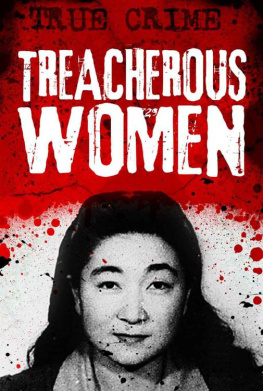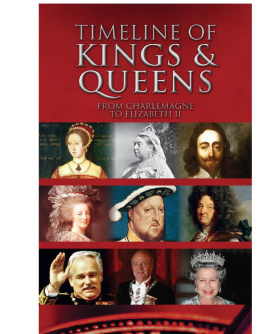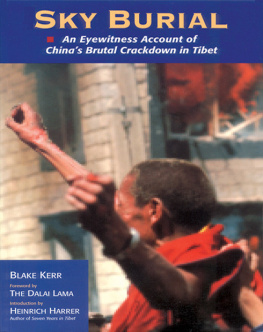Kerr - Treacherous Women: Sex, Temptation and Betrayal
Here you can read online Kerr - Treacherous Women: Sex, Temptation and Betrayal full text of the book (entire story) in english for free. Download pdf and epub, get meaning, cover and reviews about this ebook. year: 2014, publisher: Canary Press, genre: Non-fiction. Description of the work, (preface) as well as reviews are available. Best literature library LitArk.com created for fans of good reading and offers a wide selection of genres:
Romance novel
Science fiction
Adventure
Detective
Science
History
Home and family
Prose
Art
Politics
Computer
Non-fiction
Religion
Business
Children
Humor
Choose a favorite category and find really read worthwhile books. Enjoy immersion in the world of imagination, feel the emotions of the characters or learn something new for yourself, make an fascinating discovery.
- Book:Treacherous Women: Sex, Temptation and Betrayal
- Author:
- Publisher:Canary Press
- Genre:
- Year:2014
- Rating:5 / 5
- Favourites:Add to favourites
- Your mark:
- 100
- 1
- 2
- 3
- 4
- 5
Treacherous Women: Sex, Temptation and Betrayal: summary, description and annotation
We offer to read an annotation, description, summary or preface (depends on what the author of the book "Treacherous Women: Sex, Temptation and Betrayal" wrote himself). If you haven't found the necessary information about the book — write in the comments, we will try to find it.
Kerr: author's other books
Who wrote Treacherous Women: Sex, Temptation and Betrayal? Find out the surname, the name of the author of the book and a list of all author's works by series.
Treacherous Women: Sex, Temptation and Betrayal — read online for free the complete book (whole text) full work
Below is the text of the book, divided by pages. System saving the place of the last page read, allows you to conveniently read the book "Treacherous Women: Sex, Temptation and Betrayal" online for free, without having to search again every time where you left off. Put a bookmark, and you can go to the page where you finished reading at any time.
Font size:
Interval:
Bookmark:
Treacherous Women
Sex, Temptation and Betrayal
G ORDON K ERR

Contents
Yoshiko Kawashima
She was known as Eastern Jewel and was one of the most extraordinary women of the 20th century, helping to foment war between China and Japan. Working as a spy, throughout her life she seduced countless men, many of them rich and powerful. Not for nothing was she known as the eastern Mata Hari.
She was born a Manchu princess in 1906, fourteenth daughter of Prince Xu who ruled Inner Mongolia and claimed to be descended from the emperor who founded the Qing Dynasty in 1616. However, she was adopted by one of the Princes Japanese advisers, Naniwa Kawashima, who changed her Chinese name, Jin Bihui, to the Japanese Yoshiko Kawashima. Educated in Japan, learning judo and fencing, she effectively became Japanese, forgetting her origins and being taught to hate China. When her father died in Port Arthur, her mother, deprived of a position in society, committed suicide. Eastern Jewel was reported to be unmoved on hearing the news.
She did begin to demonstrate some odd behaviour, however, at the age of seventeen, when she started wearing mens clothing. It is said by some that she began to do so after being raped by her adopted father. However, by now, she was a striking woman like a film star, some said, with a strong personality.
The Japanese decided to dispatch Yoshiko to Manchuria to marry a Mongol prince, Kanjurab. They surmised that with her there, they would have a grip on what happened in Manchuria. Unfortunately, however, the marriage was short-lived. Eastern Jewel tired of her new husband after just four months and left Mongolia for the Chinese coast before returning to Tokyo, where she lived in the student quarter. There, she adopted yet another identity, calling herself Yang Kuei Fei.
Tiring of Tokyo, in 1928 she persuaded a member of the Japanese ruling elite to take her with him to Shanghai where, at a New Year party, she bumped into the Japanese Major General Takayoshi Tanaka, of the Shanghai Special Service. Eastern Jewel, in her customary garb of riding breeches, black knee-high boots, army jacket and riding crop, pushed Tanaka into a back room and proceeded to make love to him. To their delight, the couple discovered that they shared a fetish for boots and he was never allowed to take his off. They began a passionate affair.
Tanaka worked for Major-General Kenji Doihara, a man known as Lawrence of Manchuria because of his knowledge of that country. Doihara had established an intricate network of spies in China and Eastern Jewel was perfect for it, especially as she was acquainted with the boy-emperor, Pu Yi, who would be the Last Emperor of China. The Japanese wanted Pu Yi to return to his homeland, Manchuria, to allow them to use him as a pretext for invading the country. She was, after all, close to him and he had told her that his home was her home.
First, however, she was engaged by Tanaka in 1931 to create enough of a disturbance in Shanghai to justify an invasion by Japanese troops to keep the peace. She was given $10,000 which she used to pay thugs to attack Japanese businesses. The Japanese army duly arrived to protect Japanese interests and citizens. They were eventually forced to withdraw when diplomatic pressure was brought to bear by countries around the world.
At this point, Doihara decided to make use of Eastern Jewels friendship with Pu Yi. She was told to persuade him to move to Mukden in Manchuria, where the Japanese would install him as a puppet emperor who would fully support their move into the country. They believed that he would be so fed up with his treatment in China at the hands of Sun Yat-sen, leader of the Kuomintang that he would do anything to take revenge.
Eastern Jewels first effort was to tell him that his life was in danger if he did not move, but he refused to go. She then orchestrated assassination attempts that she thwarted finding poisonous snakes in his bed or discovering bombs in a basket of fruit. Still, he would not move. It is reported that, frustrated at the delay, Doihara arrived in Tientsin and asked to see Eastern Jewel. She turned up disguised as a man and fooled the Major General until she spoke to him. He and Eastern Jewel decided that the best way to frighten Pu Yi was to have Chinese terrorists attack his Japanese guards at his villa. She hired the attackers and, at last, the emperor was frightened into leaving for Mukden.
He was installed as Emperor of Manchuko and almost immediately, the Japanese launched their invasion, claiming that the emperor had requested it to preserve peace. Eastern Jewel, meanwhile, was rewarded for her work. She was appointed commander and was given the right to wear the full dress Japanese uniform commensurate with her rank. Needless to say, given her penchant for dressing in mens clothes, she was delighted.
On 23 February 1932, as Shanghai burned under an onslaught of Japanese bombing, Eastern Jewel was flown over the city by the Japanese Air Force. She was said to have laughed and clapped her hands as she looked down on the devastation and horror below her. The massive loss of life seemed to mean nothing to her, a fact emphasised by her laughter with Japanese officers as she later stepped over the dead bodies of men, women and children as she walked in the streets. It meant nothing to her, but her callousness meant a great deal to any Chinese who witnessed it. It would not be forgotten.
She continued her work for the Japanese. In Manchuko she became the mistress of Major General Hayao Tada, Pu Yis chief military adviser, and in 1932 she created an Anti-Bandit Force. She recruited between three and five thousand former bandits to hunt down the lawless bandit and guerrilla groups that were running wild. She commanded this force for a number of years.
When the Japanese army captured Beijing in 1937, she went to live there with orders to spy and report on local activity. She took money from prominent people to ensure that they would not come under suspicion of collaboration with the forces of Chiang Kai-shek, who had taken control of the Kuomintang following the death of Sun Yat-sen in 1925. If they failed to pay she would report them as agitators or spies.
By the end of the war, however, Eastern Jewel was a shadow of her former self. Her beauty had faded and she was haggard and bloated. Her sexual practices were legend, reportedly sleeping with as many as twelve men at one time, including very often members of the Japanese guard assigned to protect her. When she was bored she would send the guards to the local theatres as she had developed a liking for handsome young actors.
She had claimed that she had been raped by her foster father and foster grandfather when she was just fifteen and that her father had forced her to have sex with Japanese officers. She also blamed her behaviour on her rejection by a young Japanese officer named Yamaga. Her extravagant love life was her revenge on him, she claimed.
Her promiscuity had its penalties, however, and she was now riddled with syphilis, her body covered in running sores. She drove around Beijing in an abandoned army truck, causing disgust amongst passers-by.
The re-capture of the capital was the worst possible news for Eastern Jewel. Her money was gone now, spent on protection during the war years and she went into hiding, changing her name and living in a run-down hovel. On 11 November, 1945, a news report announced that a long sought-for beauty in male costume was arrested in Peking by the Chinese counter-intelligence officers.
In 1948 Eastern Jewel was tried before a military court for treason, espionage and war crimes. The chief prosecutor reminded the court of her callousness on the day she flew over the ravaged capital. This woman deserves death as a traitor, he said, but most of all because she rode in Japanese airplanes over bombed-out villages and laughed.
Next pageFont size:
Interval:
Bookmark:
Similar books «Treacherous Women: Sex, Temptation and Betrayal»
Look at similar books to Treacherous Women: Sex, Temptation and Betrayal. We have selected literature similar in name and meaning in the hope of providing readers with more options to find new, interesting, not yet read works.
Discussion, reviews of the book Treacherous Women: Sex, Temptation and Betrayal and just readers' own opinions. Leave your comments, write what you think about the work, its meaning or the main characters. Specify what exactly you liked and what you didn't like, and why you think so.


















